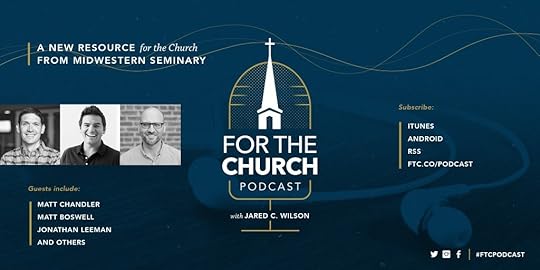Jared C. Wilson's Blog, page 20
May 2, 2017
“The Imperfect Disciple” Releases Today!
My new book The Imperfect Disciple: Grace for People Who Can’t Get Their Act Together releases today! I’d love for you to pick one up for yourself (and maybe one for a friend?).
This is perhaps my most unique book yet, a creative non-fiction approach to the gospel call to follow Jesus, full of reflections and confessions and narrative exultation. It’s very practical, but if you’re looking for a nuts-and-bolts, “how to” manual, this ain’t it. Instead, I wrote the book — which covers things like idolatry, repentance, the spiritual disciplines, the importance of church membership, etc. — like I am sitting across from you in a coffee shop while we have one of those conversations about being at the end of our rope. That’s where Jesus is, anyway.
Here’s a little more on what the book is about:
The Imperfect Disciple is a discipleship book for people who are a little tired of discipleship books. This one is for the rest of us — people who screw up, people who are weary, people who are often wondering in church if it’s safe to say what they’re really thinking.
For the believer who is tired of quasi-spiritual “lifehacks” and fuzzy “fortune cookie” spirituality, here is a discipleship book that isn’t afraid to be honest about the mess we call real life.
And here’s what people are saying about it:
“Jared does a great job, with his humorous yet serious style, reminding us of God’s perfection in the midst of our inconsistencies, fears, and falls — in other words he has faithfully ‘demystified discipleship.’ Whether you feel you’re barely hanging in there or riding a wave of joy-saturated obedience, the grace of God found in this book will encourage and remind the saint that there is only One who is perfect.”
– Matt Chandler
“This is the most refreshing and encouraging book of discipleship I’ve read in the past decade. With tears, I write this ‘blurb,’ because Jared has given fresh words, voice, and understanding to this grand reality.”
– Scotty Smith
“I needed this book more than words can express.”
– Ann Voskamp
“Yet another discipleship book. Perhaps you had those thoughts when you picked up Jared Wilson’s Imperfect Disciple. It’s not. Not even close. Wilson takes our idea of discipleship and turns it on its head. Wilson makes us dizzy with gospel truth and disoriented by beholding the Lamb of God. He helps us refocus so that our obedience is no longer about us. You’ll be encouraged as you read this book.”
– Trillia Newbell
“This book is different. Jared ties everything he has to say about being and loving disciples to the realities of what Jesus has already done. And that, dear friends, is what sets this wonderful book apart from all the others. Please do buy it. Buy one for a friend. And then read it together–and rejoice in the gospel.”
– Elyse M. Fitzpatrick
“I’ve read too many ‘discipleship’ books that made me feel, somehow, less. This book is the exact, wonderful opposite. It’s like talking with a very insightful friend about Jesus. It’s honest, thoughtful, and unpretentious.”
– Brant Hansen
“Too often discipleship is described in strings of clichés. In The Imperfect Disciple, Jared Wilson cuts the string, shares his story, and helps readers envision following Jesus in clear, inviting, and realistic ways.”
– Mike Cosper
“The Imperfect Disciple is a book about grace for people who know about grace. For anyone who draws confidence — or shame — from the belief that God is keeping track of their goodness, this book is for you.”
– Sharon Hodde Miller
“Follow Jared as he demystifies discipleship on this unpredictable quest into the kindness of Christ.”
– Christian George
“I’m grateful for this refreshing, grace-saturated, and realistic treatment of what it means to follow Jesus.”
– Michael Kelley
“In a world — and church — infatuated with ‘leaders,’ ‘platforms,’ and ‘influence,’ The Imperfect Disciple offers a much-needed antidote to our leadership overdose: following. Jared Wilson reminds us that following Christ is not about what we do but about who we are. And we need be no more — or no less — than flawed but faithful disciples of the One who has already won all of our battles for us.”
– Karen Swallow Prior
Again, I’d be honored, if you’d consider adding this effort to your reading list. You can buy it anywhere Christian books are sold. Here’s an Amazon link.
And if you like it, posting a review on Amazon would be a huge benefit to helping get the word out.
Thanks, friends.
May 1, 2017
Where I’ll Be, Summer 2017
Every now and then, for those who are interested, I share some of my upcoming speaking dates. If you’re in any of these areas and able to attend, would be great to meet you.
May 11-12, 2017 – RightNow Media Conference. Chicago, IL. I’ll be giving another talk on the church’s need to re-embrace biblical supernaturalism at this event next week, also featuring Eric Mason, Chip Ingram, Jen Polloch-Michel and others.
May 21, 2017 – Redemption Church. Rutland, VT. This is a sweet one for me, as I was casting vision for this church planting effort when I first landed in Vermont in 2009. A few months after I moved to Kansas City, some precious saints launched first services. Looking forward to being with them.
July 9, 2017 – Houston Northwest Church. Houston, TX. I grew up in this church but preached on a Sunday for the first time last year, twenty years after leaving Houston. Looking forward to being back again this summer.
July 16-20, 2017 – SALT Conference. Wheaton, IL. Sponsored by the Hmong District of the CMA.
August 7-8, 2017 – The Normal Pastor Conference. Orlando, FL. I’ll be joining Zack Eswine, Won Kwak, John Onwuchekwa, Erik Raymond, & Joe Thorn for this event aimed at encouraging the ordinary shepherd. If you haven’t already signed up, whatcha waiting for?
August 31-September 1, 2017 – Trinity Baptist College. Jacksonville, FL. Speaking in chapel.
My full speaking calendar is available here. And if you’re interested in having me speak or preach at your church or event, inquiries may be sent via this page.
April 27, 2017
Discipleship for the Rest of Us
 Here’s a question I used to ask people I taught in church: “What do you think of when you hear the word discipleship?”
Here’s a question I used to ask people I taught in church: “What do you think of when you hear the word discipleship?”
Some people would play word-association and I’d get a string of adjectives in response: difficult, trusting, adventurous, obedient, and so on.
I don’t recall many people thinking too long about the question. Very quickly somebody would offer up the “right answer”—at least, the right answer for our context—“Discipleship means following Jesus.”
Well, yeah.
Christian discipleship does mean following Jesus. It means following Jesus wherever he goes. It means lashing ourselves to him like a sailor in a storm-tossed boat might lash himself to the mast. If the ship goes down, so do we. If the mast gets struck by lightning, so do we.
When church people say “Discipleship means following Jesus,” I think they tend to picture a group of sun-tanned dudes in cantata-quality robe costumes peacefully strolling through green pastures, perhaps stopping here and there under the comfortable shade of a tree to watch Jesus smile at them and tousle the hair of precocious children scampering about at his Birkenstocked feet.
Or maybe I’m just cynical.
When I ask “What do you think of when you hear the word discipleship?” I’d love to hear people answer more along these lines:
“Believing God has a plan for me even when I’m afraid he doesn’t.”
“Believing God loves me even when I feel like nobody else does.”
“Trusting that God is doing something for my good even though my life has always been terrible up till now.”
“Following Jesus even though my feelings speak more loudly.”
“Denying myself to do what’s right although I don’t really want to.”
“Imagining a time when I won’t hurt as much as I do now.”
“Imagining a time when my spouse or child won’t hurt as much as they do now.”
You get the idea, I hope. None of those responses really suffices as a definition of discipleship like you’d find in a theological dictionary, but they all put more skin on the word, I think.
Sometimes I read books and articles on discipleship and I wonder who in the world they’re written for. And then I remember: Oh, yeah—for people who give the Sunday school answers in Sunday school but save the real life-or-death, grasping-for-meaning, gasping-for-breath grappling with God for those rare moments when they’re all alone, undistracted, and unable to fend off the crushing sense of their own inadequacies and apprehensions about the world and their place in it. A lot of the ways the evangelical church does discipleship seem designed for people who don’t seem to really need it. It’s like the uber-toned Crossfit junkie who adds a spin class to his weekly schedule, because, well, why not?
I wonder sometimes how all of our steps, tips, and quasi-spiritual lifehacks come across to the Christian woman married to an unbelieving husband completely apathetic to the things of God, to the young Christian whose parents aren’t saved and hate that he is, to the husband whose wife seems more interested in Pinterest than in him, to the working-class guys and gals who see through the slick pick-me-ups of the privileged, and to the frequently discouraged, the constantly disappointed, and the perennially depressed.
For those of us who have struggled our whole lives to get our acts together, what does a discipleship built around getting your act together eventually do?
Well, I don’t know about you, but it about made me give up.
My publisher, Baker Books, wanted me to write a book on discipleship. I said, Okay. But I had one condition: it has to be printed with my blood.
Naturally, they had some health concerns about that—for me and for you. So I clarified: I don’t want to write the kind of discipleship book most people are too afraid to say they’re sick of. I don’t want to write a discipleship book for people who put notches on their Belts of Truth every time they read a discipleship book. I don’t want to write about being extreme or radical or taking it to the limit or maxing out your potential or reaching the stars or drinking cloud-juice or whatever.
I want to write a discipleship book for normal people, for people like me who know that discipleship means following Jesus, and we know that following Jesus is totally worth it, because Jesus is the end-all, be-all, but we often find that following Jesus takes us to some pretty difficult places. I want to write a book for the Christians whose discipleship has gotten them a little bloody.
So I said, “How about a book on discipleship for people who don’t feel saved each morning until they’ve had at least two cups of coffee? How about a book on following Jesus for the guy or gal sitting there in small group always wondering if it’s safe to say what they’re thinking? For the sake of the cut-ups and the screw-ups, the tired and the torn-up, the weary and the wounded—how about we demystify discipleship?”
And they said, astonishingly, “Okay.”
This book on following Jesus is for all of you people who, like me, are tired of the mass-marketed, self-helpy “be a better Christian” projects. It’s not printed with my blood. But I did bleed on the pages a little bit.
April 25, 2017
The Lord Is Never Late
 Reading in my friend Michael Kelley’s book Wednesdays Were Pretty Normal, about his family’s journey of faith through their young son’s battle with leukemia, I found a passage of reflection taking me back in time. I do not know the fear and grief of having a child with a life-threatening illness, but when Michael writes —
Reading in my friend Michael Kelley’s book Wednesdays Were Pretty Normal, about his family’s journey of faith through their young son’s battle with leukemia, I found a passage of reflection taking me back in time. I do not know the fear and grief of having a child with a life-threatening illness, but when Michael writes —
I prayed. I petitioned. I cried. And I felt . . . nothing. Emptiness. Despair. Isolation. Darkness. Where was He, this God who so loved the world? Where was the great Healer? We needed Him there, in that cubicle of a hospital room. Doing something. Healing something. Springing into action. I didn’t need a Jesus that was sleeping in the boat while the storms raged around His friends. I needed a Jesus who was turning over the tables of sickness and disease and calling out cancerous cells like they were demons.
— this I know.
I was taken back to the smell of the guest bedroom carpet, where my nose had been many hours of many nights, my eyes wetting the fabric as I cried out to God. You ever groaned? If you have, you’d know. I planted my face in that floor and prayed guttural one-word prayers til I couldn’t speak any more. The lullaby music from my daughter’s room across the hall haunted me. I felt alone, unloved, unaccepted, and unacceptable. But I knew I deserved it all, so I was trying to be as submissive to God’s discipline as I could. But it hurt. Oh God it hurt.
I was clinging to the hem of Christ’s garment in desperation in those days, beyond begging him for the restoration of my marriage, beyond begging him for forgiveness of my sins, beyond begging him to take away my thoughts of suicide. I just wanted to know he was there.
The Bible says “faith is the assurance of things hoped for, the conviction of things not seen” (Heb. 11:1). And by his grace I had that faith. A tiny sliver of it, to be sure, but I had it. Half a mustard seed maybe, clenched in my fist. All visible evidence to the contrary, I was still too afraid of the alternative. I was too scared to believe God didn’t exist, that he didn’t love me, that he didn’t care. I was exhausted, but my stubbornness and that speck of faith persisted even in the spiritual silence.
And then one night I heard the voice of the Spirit, not audibly mind you, but clearly, straight to my heart, applying the word of the gospel to me: “I love you, and I approve of you.” Because I had been exposing my mind to the gospel at that time, I knew he meant that he approved of me “in Christ,” not that he approved of my sin or righteousness; that much was clear by the devastation I was in. Like the prodigal son, “I came to my senses.”
In my pained estimation in those dark days, the Lord was moving much too slowly, but I knew in that moment that he is not slow in keeping his promises (2 Pet. 3:9). He was holding me all along, and his reviving word came right on time. I pray I will remember this in dark days to come.
The Lord is never late.
Don’t give up.
For still the vision awaits its appointed time;
it hastens to the end—it will not lie.
If it seems slow, wait for it;
it will surely come; it will not delay.
— Habakkuk 2:3
April 20, 2017
New Podcast: For The Church
Over at For The Church we’re launching a brand new resource this week! Introducing: The For The Church Podcast. Hosted by yours truly and featuring some of our favorite leaders in church ministry, this new podcast is sure to make a worthy addition to your regular listens. Download, subscribe, enjoy!
Episode 1 featuring Matt Chandler on mission, sermon prep, and multi-site ministry.
Episode 2 featuring Matt Boswell on songwriting, why hymns matter, and more.
Episode 3 featuring Jared Wilson on avoiding ministry burnout.
And more to come!
April 18, 2017
What Works?
 From Thomas Chalmers’ “The Expulsive Power of a New Affection”:
From Thomas Chalmers’ “The Expulsive Power of a New Affection”:
“The love of the world cannot be expunged by a mere demonstration of the world’s worthlessness. But may it not be supplanted by the love of that which is more worthy than itself? The heart cannot be prevailed upon to part with the world, by a simple act of resignation. But may not the heart be prevailed upon to admit into its preference another, who shall subordinate the world, and bring it down from its wonted ascendancy?
“If the throne which is placed there must have an occupier, and the tyrant that now reigns has occupied it wrongfully, he may not leave a bosom which would rather detain him than be left in desolation. But may he not give way to the lawful sovereign, appearing with every charm that can secure His willing admittance, and taking unto himself His great power to subdue the moral nature of man, and to reign over it?
“In a word, if the way to disengage the heart from the positive love of one great and ascendant object, is to fasten it in positive love to another, then it is not by exposing the worthlessness of the former, but by addressing to the mental eye the worth and excellence of the latter, that all old things are to be done away and all things are to become new. To obliterate all our present affections by simply expunging them, and so as to leave the seat of them unoccupied, would be to destroy the old character, and to substitute no new character in its place. But when they take their departure upon the ingress of other visitors; when they resign their sway to the power and the predominance of new affections; when, abandoning the heart to solitude, they merely give place to a successor who turns it into as busy a residence of desire and interest and expectation as before – there is nothing in all this to thwart or to overbear any of the laws of our sentient nature – and we see how, in fullest accordance with the mechanism of the heart, a great moral revolution may be made to take place upon it.
“This, we trust, will explain the operation of that charm which accompanies the effectual preaching of the gospel.”
April 14, 2017
6 Things Christ Does With Your Sin
 On this Good Friday, it is good to remember what the cross accomplishes.
On this Good Friday, it is good to remember what the cross accomplishes.
Here are six things Jesus does with sin:
1. He Condemns It.
Jesus puts a curse on sin. He marks its forehead.
Romans 8:3 – “For God has done what the law, weakened by the flesh, could not do. By sending his own Son in the likeness of sinful flesh and for sin, he condemned sin in the flesh.”
Jesus says to sin in no uncertain terms, “Sin, you’re going to die.”
2. He Carries It.
Like the true and better scapegoat, Jesus becomes our sin-bearer.
1 Peter 2:24 – “He himself bore our sins in his body on the tree, that we might die to sin and live to righteousness. By his wounds you have been healed.”
2 Corinthians 5:21 – “For our sake he made him to be sin who knew no sin, so that in him we might become the righteousness of God.”
3. He Cancels It.
He closes out the account. (Even better, he opens a new one, where we’re always in the black, having been credited with his perfect righteousness.)
1 Corinthians 13:4-5 – “Love is patient and kind; love does not envy or boast; it is not arrogant or rude. It does not insist on its own way; it is not irritable or resentful”
That word resentful is more directly “to count up wrongdoing,” which is why some translations of this text say, “Love keeps no record of wrongs.”
Colossians 2:13-14 – “And you, who were dead in your trespasses and the uncircumcision of your flesh, God made alive together with him, having forgiven us all our trespasses, by canceling the record of debt that stood against us with its legal demands. This he set aside, nailing it to the cross.”
That last proclamation leads us into this great truth:
4. He Crucifies It.
1 Peter 3:18 – “For Christ also suffered once for sins, the righteous for the unrighteous, that he might bring us to God, being put to death in the flesh but made alive in the spirit.”
At the cross, Jesus dies and takes our sin with him. Only the sin stays dead.
5. He Casts It Away.
Jesus takes the corpse and chucks it into the void.
Micah 7:19 – “He will again have compassion on us; he will tread our iniquities underfoot. You will cast all our sins into the depths of the sea.”
Psalm 103:12 – “as far as the east is from the west, so far does he remove our transgressions from us.”
6. He Chooses to Un-remember It.
Jesus is omniscient. He is not forgetful. But he wills to un-remember our sin.
Jeremiah 31:34 – “And no longer shall each one teach his neighbor and each his brother, saying, ‘Know the LORD,’ for they shall all know me, from the least of them to the greatest, declares the LORD. For I will forgive their iniquity, and I will remember their sin no more.”
Hebrews 8:12 – “For I will be merciful toward their iniquities, and I will remember their sins no more.”
Hebrews 10:17 – “I will remember their sins and their lawless deeds no more.”
Astonishing. We bring our sin to him, repentant and in faithful confession, and he says, “What’re you talking about?”
This is how Jesus forgives sin: He condemns it, carries it, cancels it, kills it, casts it, and clean forgets it. If we’ll confess it.
1 John 1:9 – “If we confess our sins, he is faithful and just to forgive us our sins and to cleanse us from all unrighteousness.”
April 11, 2017
Pastor, Don’t Waste Your Exclamation Points
 Generally speaking, a church will over time become affected by, influenced toward, and transferred into whatever her preacher is most excited about.
Generally speaking, a church will over time become affected by, influenced toward, and transferred into whatever her preacher is most excited about.
Pastor, our people don’t usually get excited about what we tell them to be excited about. Have you figured that out yet? Instead, they get excited about what they see actually excites us.
This means we ought to steward our exclamation points wisely. If you’re one of those rah-rah guys firing on all emotional cylinders for everything from bake sales and the book table to baptisms and baby dedications, you create an equality between minutiae and missional milestones that can be disorienting, and ultimately dulling. But more directly, just remember that if everything is exciting, nothing is.
Or if the real energy of your gatherings is reserved for knock-out musical productions and cool videos but your teaching is “low-key,” sit-on-a-stool, let’s chat about how to “let God be Lord” over your finances, you are cultivating dysfunctional discipleship.
But we also have to be careful in our preaching about what we are most naturally reacting with awe to, driving home, and exulting in. If it is the biblical imperatives we communicate that what’s really exciting about God’s Word is the Law. And there is certainly a way to delight in God’s commands! (Note that exclamation point.) But over time, we will impress upon our bodies that the Law is more dazzling than the gospel, and this is fuel for a quick sprint into a brick wall. Let’s save our real enthusiasm for our beautiful Savior, our awe for his finished work, our exclamations for his grace.
April 7, 2017
Proverbs 29:18 Is Not About Your Big Ideas
 “Where there is no vision, the people perish . . .”
“Where there is no vision, the people perish . . .”
— Proverbs 29:18 (KJV)
Proverbs 29:18 may be one of the most misapplied verses in all the evangelical church today. Many a church leader has used it to spiritualize his strategies and blackmail followers into supporting his entrepreneurialism. Vision statements are cast. Mission statements are crafted to serve the vision. A list of values is composed to serve the mission. An array of programs is developed to serve the values. A stable of leaders is recruited to serve the programs. An army of volunteers is inspired to assist the leaders.
Much of what goes on in our local churches serves to make sure the church machine keeps running. In less healthy—but sometimes very big—churches, the entire machine is designed to put on an excellent weekend worship service. All of this would indeed perish if that vision were not cast.
But what if a leader’s good idea for church growth or success was not the vision Proverbs 29:18 had in mind? What if we aren’t free to insert anything we come up with, no matter how spiritual or “inspired by God”?
The verse is longer than is usually quoted. Proverbs 29:18 (in the ESV) in its entirety reads: “Where there is no prophetic vision the people cast off restraint, but blessed is he who keeps the law.”
The vision is prophetic vision; what is in mind here is the revelation of God to his biblical spokesmen. Where there is no vision shared with us by the prophets, to whom God revealed the mysteries of the ages, we like savages run wild. In other words, we may have a vision, but if it is not the one given to the biblical representatives of God’s revelation and the forecasters of God’s coming glory, it is not to be conformed to. “But blessed is he who keeps the law.” The latter part of the verse implies that when the vision of the prophets is held by the people, the blessing of living God’s way ensues.
What is the vision of the prophets? It is “the mystery hidden for ages and generations but now revealed to his saints” (Col. 1:26; see also Rom.16:25 and Eph. 3:9). The vision is Jesus.
The world would have us know a billion other things. The church would sometimes have us know many other things, as well. But those who have beheld the life-changing vision of our glorious Lord Jesus Christ know better.
— excerpted from Gospel Wakefulness
April 5, 2017
As God Lives
 Remain tonight, and in the morning, if he will redeem you, good; let him do it. But if he is not willing to redeem you, then, as the LORD lives, I will redeem you. Lie down until the morning.
Remain tonight, and in the morning, if he will redeem you, good; let him do it. But if he is not willing to redeem you, then, as the LORD lives, I will redeem you. Lie down until the morning.
— Ruth 3:13
Against the backdrop of the spiritual and cultural climate detailed in the book of Judges gleams the little story of redemptive romance called Ruth. The contrast is vivid. While “everyone did was right in his own eyes” (Judges 17:6, 21:25), the worthy man Boaz looks at pathetic, poor, widowed, foreign Ruth and says, “As the LORD lives, I will redeem you” (Ruth 3:13).
What is Boaz saying, really?
One short thing that communicates a few things:
First, he is saying his plan to redeem Ruth (and thereby the clan of Elimelech) is as sure as there is a God in heaven. “Will you redeem me?” Ruth asks, and Boaz says (in a way), “Does the pope wear a funny hat?” That kind of thing. Only he’s more reverent than I am.
Second, and more deeply, Boaz is saying that he is going to redeem Ruth because God lives. Boaz is the strange sort of man who does things because God exists. In this sense he is the most logical of men. Does God exist? If so, much must be different about my life. I ought to live my life as if God exists.
What if we all applied this standard to our motivations and determinations? What would our lives look like if we really believed the LORD lives?
Third, and deeper still, Boaz is committing to redeem Ruth—to paraphrase C. S. Lewis here—not because a God lives, but because this God lives. This means he is going to redeem her in the Lord’s way and for the Lord’s purposes. “LORD” is all caps, denoting the divine name there—YHWH. “As this personal one true God lives, I will redeem you.” According to YHWH’s glory, to make his name great, to exalt and glorify the God who is my God, Boaz will do this.
Ruth’s redemption is not only or primarily for her glory, nor is it only or primarily for Naomi’s or Boaz’s or Elimelech’s or Mahlon’s. It is God’s glory first and foremost that Boaz redeemed Ruth, and of course we don’t just see this in his words or in this short history but as we trace the history through the ages to the first chapter of the Gospel According to Matthew.
As the LORD lives, we have been redeemed. Let the redeemed of the LORD say so.







